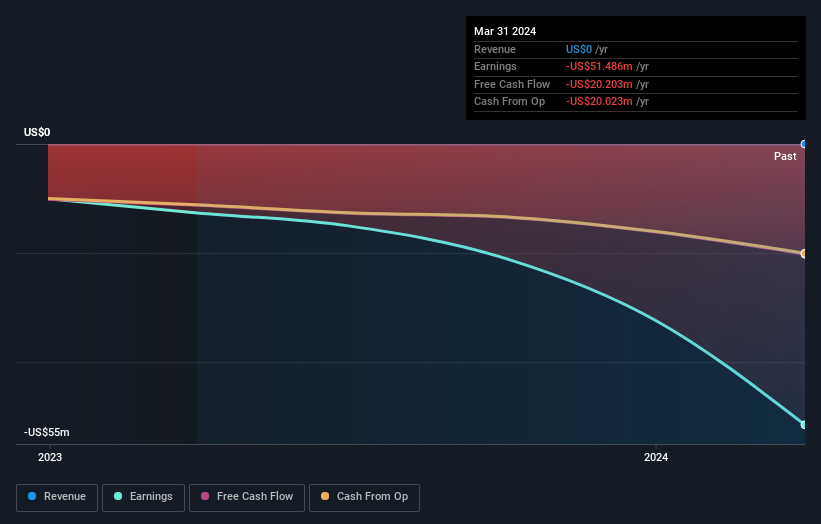Individual investors in Oklo Inc. (NYSE:OKLO) are its biggest bettors, and their bets paid off as stock gained 31% last week
Key Insights
Significant control over Oklo by individual investors implies that the general public has more power to influence management and governance-related decisions
The top 10 shareholders own 43% of the company
A look at the shareholders of Oklo Inc. (NYSE:OKLO) can tell us which group is most powerful. And the group that holds the biggest piece of the pie are individual investors with 57% ownership. In other words, the group stands to gain the most (or lose the most) from their investment into the company.
As a result, individual investors were the biggest beneficiaries of last week’s 31% gain.
Let's take a closer look to see what the different types of shareholders can tell us about Oklo.
View our latest analysis for Oklo
What Does The Institutional Ownership Tell Us About Oklo?
Institutions typically measure themselves against a benchmark when reporting to their own investors, so they often become more enthusiastic about a stock once it's included in a major index. We would expect most companies to have some institutions on the register, especially if they are growing.
Since institutions own only a small portion of Oklo, many may not have spent much time considering the stock. But it's clear that some have; and they liked it enough to buy in. If the business gets stronger from here, we could see a situation where more institutions are keen to buy. It is not uncommon to see a big share price rise if multiple institutional investors are trying to buy into a stock at the same time. So check out the historic earnings trajectory, below, but keep in mind it's the future that counts most.
Oklo is not owned by hedge funds. The company's largest shareholder is SuRo Capital Corp., with ownership of 11%. Jacob Dewitte is the second largest shareholder owning 9.2% of common stock, and Caroline Cochrane holds about 8.9% of the company stock. Two of the top three shareholders happen to be Chief Executive Officer and Member of the Board of Directors, respectively. That is, insiders feature higher up in the heirarchy of the company's top shareholders.
Our studies suggest that the top 10 shareholders collectively control less than half of the company's shares, meaning that the company's shares are widely disseminated and there is no dominant shareholder.
While it makes sense to study institutional ownership data for a company, it also makes sense to study analyst sentiments to know which way the wind is blowing. We're not picking up on any analyst coverage of the stock at the moment, so the company is unlikely to be widely held.
Insider Ownership Of Oklo
While the precise definition of an insider can be subjective, almost everyone considers board members to be insiders. Company management run the business, but the CEO will answer to the board, even if he or she is a member of it.
Insider ownership is positive when it signals leadership are thinking like the true owners of the company. However, high insider ownership can also give immense power to a small group within the company. This can be negative in some circumstances.
It seems insiders own a significant proportion of Oklo Inc.. It is very interesting to see that insiders have a meaningful US$224m stake in this US$1.2b business. It is good to see this level of investment. You can check here to see if those insiders have been buying recently.
General Public Ownership
The general public, who are usually individual investors, hold a substantial 57% stake in Oklo, suggesting it is a fairly popular stock. This level of ownership gives investors from the wider public some power to sway key policy decisions such as board composition, executive compensation, and the dividend payout ratio.
Private Equity Ownership
Private equity firms hold a 23% stake in Oklo. This suggests they can be influential in key policy decisions. Some might like this, because private equity are sometimes activists who hold management accountable. But other times, private equity is selling out, having taking the company public.
Next Steps:
It's always worth thinking about the different groups who own shares in a company. But to understand Oklo better, we need to consider many other factors. Take risks for example - Oklo has 3 warning signs we think you should be aware of.
Of course, you might find a fantastic investment by looking elsewhere. So take a peek at this free list of interesting companies.
NB: Figures in this article are calculated using data from the last twelve months, which refer to the 12-month period ending on the last date of the month the financial statement is dated. This may not be consistent with full year annual report figures.
Have feedback on this article? Concerned about the content? Get in touch with us directly. Alternatively, email editorial-team (at) simplywallst.com.
This article by Simply Wall St is general in nature. We provide commentary based on historical data and analyst forecasts only using an unbiased methodology and our articles are not intended to be financial advice. It does not constitute a recommendation to buy or sell any stock, and does not take account of your objectives, or your financial situation. We aim to bring you long-term focused analysis driven by fundamental data. Note that our analysis may not factor in the latest price-sensitive company announcements or qualitative material. Simply Wall St has no position in any stocks mentioned.

 Yahoo Finance
Yahoo Finance 

